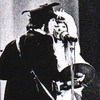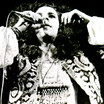Ilumencarnados seres
Três trópicos da tropicália
a duty to the dead
Although I’ve always kept quiet, I feel myself duty-bound to speak so that Torquato, Glauber Rocha and Hélio Oiticica did not lose, in addition to their lives, their reason for having existed. It’s even a question of historical justice. We who paid – I myself with prison and torture, Caetano and Gil with exile, and Glauber, Hélio and Torquato, with death – deserve a deeper interpretation of our roles.
Torquato could still be alive among us. We are all potential suicides. I wrote a text in which I tried to say this: ‘I could have killed myself’. Although I can’t deny he had a tendency to depression, and his lyrics talk of death and of the end, this means nothing. I myself and many others have at sometime written darker lyrics than his and we are still here, very much alive. This is too obvious a trail. It could be false. Fundamentally, what Torquato lacked at the critical moment, at a moment of great difficulty for the country, were exactly solid references and supports. He felt alone. He was not Nosferatu. He was a great lyric poet, a person of great delicacy. My authority to talk of this is historically conferred because when Torquato, Glauber and Hélio Oiticica referred to me they always talked of friendship. It was always something loving. This authority is a question of duty, something almost tragic. It’s a sort of Hamlet-like duty toward the dead.






















